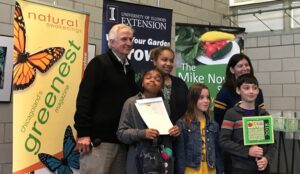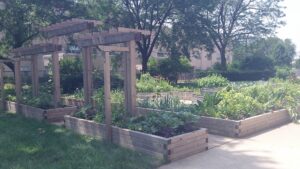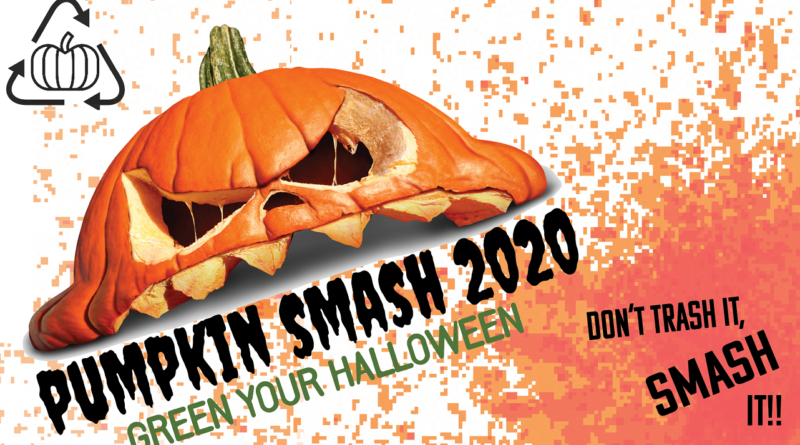Smashing Pumpkins…Responsibly
Podcast: Play in new window | Download (Duration: 1:53:57 — 52.2MB)
Subscribe: Apple Podcasts | Spotify | Android | iHeartRadio | Podchaser | Email | TuneIn | RSS | More
(October 25, 2020) There might not be a lot of trick or treating this Halloween, but there will still be pumpkins. And, as usual, folks will be tempted to heave them into the garbage after the holiday. However, when it comes to smashing pumpkins, there’s a new strategy taking hold across the country. And it has a lot to do with a ground-breaking organization in DuPage County called School & Community Assistance for Recycling and Composting Education, or SCARCE. And that started with a woman named Kay McKeen.
Skip to a specific segment in this podcast
4:20 Kay McKeen from SCARCE and Amy DeLorenzo of Illinois Extension
34:34 Jerry Adelmann from Openlands
1:01:59 Emily Lambert from Kellogg Elementary School and Renea Lyles of UIC Nutrition Teaching Garden
1:22:44 Meteorologist Rick DiMaio
Kay McKeen, started SCARCE (formerly SCRAP) in 1990 and began teaching in DuPage County schools about recycling and other environmental issues and concerns. Kay was out teaching when she realized that many schools had countless textbooks just sitting in storage, taking up space. All the while, the information was becoming obsolete, it was costing the schools money for the books to sit in storage AND they were going to end up in the landfill! Therefore, in 1991 she started the Book Rescue with the idea of “rescuing” gently used books (text, reference and library) from going in the landfill, and instead putting them into the hands of those who need them.
From there, the organization expanded its operation to include recycling paper, writing utensils, crayons, holiday lights, cords and wires, musical instruments, and much more. SCARCE also participates in unique recycling programs through Terracycle. It has been involved in the passage of numerous environmental bills in Illinois, with topics ranging from composting to safe pharmaceuticals to food donation to lead poisoning prevention.
In 2014, McKeen had an idea about how to keep the 650,000 tons of discarded pumpkins out of landfills after Halloween. SCARCE and the cities of Wheaton and Elmhurst hosted the first pumpkin collections that year, diverting 9.31 tons of pumpkins from landfills and helping to improve composting laws in Illinois. By 2016 the Pumpkin Smash grew to over 31 sites across the state. To date, The Pumpkin Smash has diverted over 377 tons of pumpkins from landfills.
And it’s back again this year, on Saturday, November 7, with support from Illinois Extension and with several drop off locations in Chicago. We talked with Extension in anticipation of last year’s event. This year, they’re promoting the event at Plant Chicago at ‘the Firehouse’, 4459 S. Marshfield Ave. Chicago IL 60609. But you can see the full list of locations for the entire region by scrolling down this page and using the interactive map. In fact, an old friend of mine wrote to me today to alert me to the Pumpkin Smash sponsored by the Edgewater Environmental Sustainability Project (EESP) from Noon to 4pm at St. Andrew Greek Orthodox Church at 5649 N. Sheridan in the south end of the parking lot.
Kay McKeen is back on our show this morning to talk about the Pumpkin Smash and her work at SCARCE. She is joined by Amy DeLorenzo, a University of Illinois Educator in the area of nutrition and wellness, who has worked with the Illinois Food Scrap Coalition and the Wasted Food Action Alliance, among other organizations.
Jerry Adelmann and the important work of Openlands
Another person who returns to our program this morning after too long an absence is Jerry Adelmann, President and CEO of Openlands.
It’s difficult to wrap one’s head around the scope of Openlands activities, but we’ll discuss a few this morning.
- The RENEW Conservation Corps Act proposed by Illinois Senator Dick Durbin is a green jobs bill, working to build green infrastructure. It will employ one million Americans across the country, but will also help our region. With echoes of the Civilian Conservation Corps (CCC) of the New Deal Era, it would put people to work on projects like
-
- Planting trees
- Restoring and managing wildlife habitat
- Controlling invasive species
- Restoring streams, wetlands, and other aquatic ecosystems
- Constructing and maintaining trails, bridges, campgrounds, picnic shelters, or other recreational amenities for use by the public.
You can take action to support the RENEW Act here.
-
- I was handed a spectacular brochure a couple of weeks ago from friend of the show Tom Shepherd. It was for something called the African American Heritage Water Trail. It shows how Openlands doesn’t just protect land but connects people to the natural places near to where they live. The Little Calumet River and connected waterways flow through several several south-side Chicago neighborhoods and 180 years of African American history.
The Heritage Water Trail honors this history by memorializing the remarkable stories of African Americans who settled along the river: freedom seekers who traveled the Underground Railroad, trailblazers who defied discrimination, learned to fly, and became Tuskegee Airmen, and pioneers in the struggle for civil rights and environmental justice. These stories of courage and fortitude have shaped our nation.
- Earlier this year, we welcomed Peggy Salazar from the Southeast Environmental Task Force (SETF) and Gina Ramirez of the Natural Resources Defense Council (NRDC) to talk about environmental issues on the southeast side of Chicago. One of those issues is a plan by the U.S. Army Corps of Engineers to vertically expand a toxic dredge disposal facility, known as a “confined disposal facility” (CDF), on the shore of Lake Michigan at the Calumet River. Openlands was one of the organizations that submitted final comments on the proposal. They’re waiting for the record of decision to be made but are disappointed that both the City and Chicago Park District are supportive of what they consider a short sighted proposal.
We also hope to touch on the
- Openlands Lakeshore Preserve, currently closed while repairs are made to areas damaged by high lake levels and storms.
- The Urban Forestry Advisory Board, which another issue that we have covered on this show. In the wake of the thousands of trees Chicago lost due to the August derecho, the nee to protect our trees and expand the canopy is greater than ever.
Who knows what else we’ll discuss?
The 60-Second Garden Video Challenge Winners

Last week, we announced the winners of the inaugural 60-Second Garden Video Challenge, presented by the Chicago Excellence in Gardening Awards (CEGA). This would have been CEGA’s fourth year of rewarding the best gardens and gardeners in the City of Chicago. The COVID-19 pandemic quickly put an end to this year’s competition. So we regrouped and asked gardeners to send us one-minute videos of their plots of paradise. We posted them on our YouTube channel an asked viewers to vote for their favorites.
We awarded prizes for the months of July, August and September. Then, a week or so into October, and some 13,000 views later, we announced overall winners in two categories–Residential and Institutional.
Monthly winners
July – Ella’s Garden
August – Chicagos Lakeview Community Garden at Diversey
September – UIC Nutrition Teaching Garden
Overall Residential Winners
1. Ella’s Garden (Ela Orlowska)
2. Solace in the City 2020 (Elise Marren)
3. Jacqueline Edens–A Sanctuary in Chicago
Overall Institutional Winners
1. Kellogg School Garden Club Presents…
2. UIC Nutrition Teaching Garden
3. Sutherland Elementary’s Outdoor Classroom
Today, we’re pleased to have two of those winning groups on our show.
Emily Lambert represents Kellogg School Garden Club. She writes,
Kellogg is a K-8th grade, Level 1+ (the highest CPS rating) neighborhood school in Chicago’s Beverly neighborhood. We are situated on a city block (about five acres), and much of the area is maintained by the school’s garden club. Kellogg has a long history of gardening, and different teachers, parents, and community members have stewarded the grounds over the years. The school grounds are defined by a majestic willow tree, but there are also vegetable gardens, a peace garden, a new pollinator garden, and two beehives. When school is in session, the after-school garden club meets weekly on Tuesdays. During the pandemic, students and volunteers have met on Saturday mornings.
Renea Lyles represents the UIC Nutrition Teaching Garden. Here’s what she has to say.

The UIC Nutrition Teaching garden is an outdoor classroom space that allows UIC students to learn more about growing food in an urban setting. Students have a hand in sowing seeds, nurturing and harvesting the plants, and then cooking these seasonal ingredients in the UIC foods lab located just upstairs from the garden. The garden also features a compost and vermicompost operation and students carefully set aside their food waste to add to the compost tumblers. Most of the students who interact with the garden are pre-health (nutrition, nursing, medical school etc.) or are current nutrition majors. This experiential learning opportunity is a valuable resource that introduces these future health professionals to the concepts of sustainability, seasonality, and professional cooking methods that result in delicious, nutritionally balanced, plant-based meals.
All in all, CEGA made lemonade this COVID year. It’s what we’re all doing, right?

